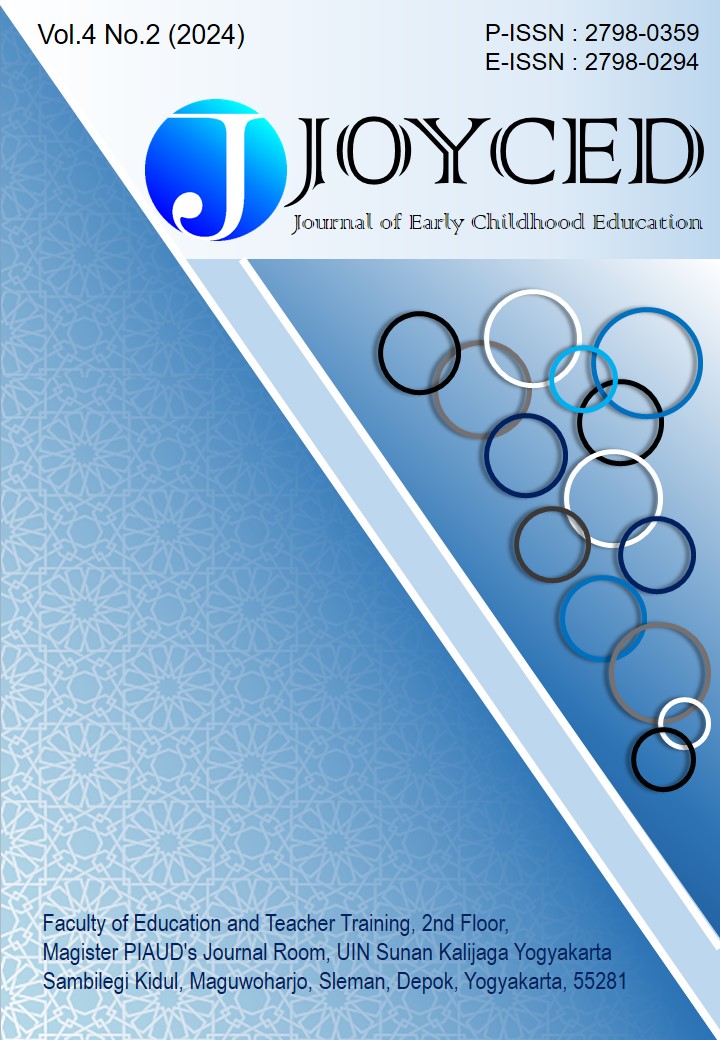Analysis of Parenting Patterns for Early Childhood with Gadget Addiction
DOI:
https://doi.org/10.14421/joyced.2024.42-05Keywords:
Early Childhood, Gadget Addiction, ParentingAbstract
This study aims to analyze the parenting style of parents towards early childhood with gadget addiction in Kerisik Tuo Village, Kayu Aro. The research method used is qualitative with a case study approach. Data was collected through in-depth interviews with five parents who had early childhood addiction to gadgets, as well as direct observation of parent-child interactions. Data analysis was carried out using thematic analysis techniques. The results of the study showed that the parenting pattern of parents for early childhood with gadget addiction in Kersik Tuo Village, Kayu Aro, tended to vary. Some parents adopt an authoritative approach, trying to limit the time spent on gadgets and provide strict supervision over their children's online activities. Meanwhile, some parents tend to give their children full freedom to use gadgets without adequate supervision. These findings identify the importance of the role of parents in controlling the use of early childhood gadgets and the need for education about the negative impact of gadget addiction on child development. This research is expected to contribute to increasing parents' awareness of the importance of healthy parenting in this digital era.
References
Adnan, M. (2020). Mengenal Pola Asuh Orang Tua Dalam Pembentukan Akhlak Anak. CENDEKIA : Jurnal Studi Keislaman, 5(2). https://doi.org/10.37348/cendekia.v5i2.80
Apriastuti, D. A. (2013). Analisis Tingkat Pendidikan dan Pola Asuh Orang Tua dengan Perkembangan Anak Usia 48-60 Bulan. Jurnal Ilmiah Kebidanan, 4(1), 1–14.
Badriah, E. R., & Fitriana, W. (2018). Pola Asuh Orang Tua Dalam Mengembangkan Potensi Anak Melalui Homeshooling Di Kancil Cendikia. Comm-Edu (Community Education Journal), 1(1), 1. https://doi.org/10.22460/comm-edu.v1i1.54
Bhattacharyya, D. (2021). Addiction to Modern Gadgets and Technologies Across Generations. Eastern Journal of Psychiatry, 18, 27–37. https://doi.org/10.5005/EJP-18-2-27
Elfiadi. (2018). Dampak Gadget Terhadap Perkembangan. Itqan, 9(2), 97–110. https://ejurnal.iainlhokseumawe.ac.id/index.php/itqan/article/download/176/147/
Fadli, M. R. (2021). Memahami desain metode penelitian kualitatif. Humanika, Kajian Ilmiah Mata Kuliah Umum, 21(1), 33–54.
Fitriana, F., Ahmad, A., & Fitria, F. (2021). Pengaruh Penggunaan Gadget Terhadap Perilaku Remaja Dalam Keluarga. Psikoislamedia : Jurnal Psikologi, 5(2), 182. https://doi.org/10.22373/psikoislamedia.v5i2.7898
Jannah, M. (2015). POLA PENGASUHAN ORANG TUA DAN MORAL REMAJA DALAM ISLAM Miftahul Jannah 1. Ilmiah Edukasi, 1, 63–79.
Mayenti, N. F., & Sunita, I. (2018). Dampak Penggunaan Gadget Terhadap Perkembangan Anak Usia Dini Di Paud Dan Tk Taruna Islam Pekanbaru. Photon: Jurnal Sain Dan Kesehatan, 9(1), 208–213. https://doi.org/10.37859/jp.v9i1.1092
Miranti, P., & Putri, L. D. (2021). Dampak Penggunaan Gadget Terhadap Perkembangan Sosial Anak Usia Dini. Jendala PLS Jurnal Cendekiawan Ilmiah Pendidikan Luar Sekolah, 6(01), 58–66. https://doi.org/10.56872/elathfal.v1i01.273
Muslima. (2015). Pola Asuh Orang Tua Terhadap Kecerdasan Finasial Anak. 1(1), 85–98.
Pebriana, P. H. (2017). Analisis Penggunaan Gadget terhadap Kemampuan Interaksi Sosial pada Anak Usia Dini. Jurnal Obsesi : Jurnal Pendidikan Anak Usia Dini, 1(1), 1. https://doi.org/10.31004/obsesi.v1i1.26
Sary, Y. N. E. (2018). Relationship of Parenting with Child Interpersonal Intelligence in Wonokerto Village, Lumajang Regency. Jurnal Obsesi : Jurnal Pendidikan Anak Usia Dini, 2(2), 137. https://doi.org/10.31004/obsesi.v2i2.93
Yumarni, V. (2022). Pengaruh Gadget Terhadap Anak Usia Dini. Jurnal Literasiologi, 8(2), 107–119. https://doi.org/10.47783/literasiologi.v8i2.369






.png)











